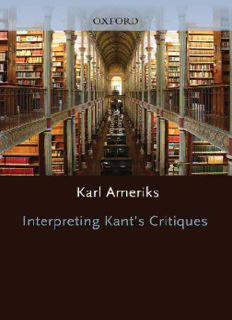
Interpreting Kant's Critiques PDF
Preview Interpreting Kant's Critiques
Interpreting Kant's Critiques This page intentionally left blank InterpretingKant's Critiques KARL AMERIKS CLARENDON PRESS · OXFORD GreatClarendonStreet,OxfordOX26DP OxfordUniversityPressisadepartmentoftheUniversityofOxford. ItfurtherstheUniversity'sobjectiveofexcellenceinresearch,scholarship, andeducationbypublishingworldwidein OxfordNewYork AucklandBangkokBuenosAiresCapeTownChennai DaresSalaamDelhiHongKongIstanbulKarachiKolkata KualaLumpurMadridMelbourneMexicoCityMumbaiNairobi SoPauloShanghaiTaipeiTokyoToronto Oxfordisaregisteredtrademark ofOxfordUniversityPress intheUK andincertainothercountries PublishedintheUnitedStates byOxfordUniversityPressInc., NewYork ©inthisvolumeKarlAmeriks2003 Themoralrightsoftheauthorhavebeenasserted DatabaserightOxfordUniversityPress(maker) Firstpublished2003 Allrightsreserved.Nopartofthispublicationmaybereproduced, storedinaretrievalsystem,or transmitted,inanyform orbyanymeans, withoutthepriorpermissioninwriting ofOxfordUniversityPress, oras expresslypermittedbylaw, or under termsagreedwiththeappropriate reprographicsrightsorganization.Enquiriesconcerningreproduction outsidethescopeoftheaboveshouldbesenttotheRightsDepartment, OxfordUniversityPress,attheaddressabove Youmustnotcirculatethisbookinanyotherbindingorcover andyoumustimposethissameconditiononanyacquirer BritishLibraryCataloguinginPublicationData Dataavailable LibraryofCongressCataloginginPublicationData Dataavailable ISBN0-19-924731-5 ISBN0-19-924732-3(pbk.) 13579108642 TypesetbyKolamInformationServicesPvt.Ltd. PrintedinGreatBritainonacid-freepaperby T.J. InternationalLtd.,Padstow,Cornwall Acknowledgements I thank the editors at Oxford University Press, and especially Peter Momtchiloff, for their invaluable assistance with this volume. On innumerable specific points I am heavily indebted to my colleagues at Notre Dame, and to the audiences for whom earlier versions of many of the chapters were presented. A major inspiration for this volume comes from the interests and questions of my students over the years, and I especially hope that this book can be of help to them and other students of Kant in the future. I acknowledge permission to reprint materials from the following publications: Introduction (and Chapter 11): portions of ‘On Being Neither Post- Nor Anti-Kantian: A Reply to Breazeale and Larmore Concerning “The Fate of Autonomy” ’, Inquiry 46 (2003), 272–92. Chapter 1: ‘Kant's Transcendental Deduction as a Regressive Argument’, Kant-Studien, 69 (1978), 273–85. Chapter 2: ‘Recent Work on Kant's Theoretical Philosophy’, American Philosophical Quarterly, 19 (1982), 1–24. Chapter 3: ‘Kantian Idealism Today’, History of Philosophy Quarterly 9 (1992), 329–42. Chapter 4: ‘The Critique of Metaphysics:Kant and Traditional Ontology’, inThe Cambridge Companion to Kant, ed. Paul Guyer (Cambridge: Cambridge University Press, 1992), pp. 249–79. Chapter 5: ‘Kant and Short Arguments to Humility’, in Kant's Legacy: Essays in Honor of L. W. Beck, ed. Predrag Cicovacki (Rochester, NY: Rochester University Press, 2000), pp. 167–94. Chapter 6: ‘Kant's Deduction of Freedom and Morality’, Journal of the History of Philosophy 19 (1981), 53–79. Chapter 7: ‘Kant on the Good Will’, in Grundlegung zur Metaphysik der Sitten, ed. Otfried Höffe (Frankfurt: Klostermann, 1989), pp. 45–65. Chapter 8: ‘Kant and Hegel on Freedom: Two New Interpretations’, Inquiry 35 (1992), 219–32. Chapter9:‘ZuKantsArgumentationzudrittenAbschnittderGrundlegung’,inSystematischeEthikmitKant,ed.Carsten Held and Hans-Ulrich Baumgarten (Freiburg: Alber, 2001), pp. 24–54. vi Chapter 10: ‘ “Pure Reason of Itself Alone Suffices to Determine the Will” ’, in Immanuel Kant: Kritik der praktischen Vernunft, ed. Otfried Höffe (Berlin: Akademie Verlag, 2001), pp. 99–114. Chapter 11: ‘On Schneewind and Kant's Method in Ethics’, Ideas y Valores 102 (1996), 28–53. Chapter 12: ‘How to Save Kant's Deduction of Taste’, Journal of Value Inquiry 16 (1982), 295–302; and ‘Kant and the Objectivity of Taste’, British Journal of Aesthetics 23 (1983), 3–17. Chapter 13: ‘New Views on Kant's Judgment of Taste’, in Kants ästhetik/Kant's Aesthetics/L'esthétique de Kant, ed. Hermann Parret (Berlin/New York: Walter de Gruyter, 1998), pp. 431–47. Chapter 14: ‘Taste, Conceptuality, and Objectivity’, in Kant Actuel, ed. F. Duchesneau, G. LaFrance, and C. Piché (Montréal/Paris: Bellarmin/Vrin, 2000), pp. 141–61. Contents Introduction: The Common Ground of Kant's Critiques 1 Part I: The First Critique and Kant's Theoretical Philosophy 49 1 Kant's Transcendental Deduction as a Regressive Argument 51 2 Recent Work on Kant's Theoretical Philosophy 67 3 Kantian Idealism Today 98 4 The Critique of Metaphysics: Kant and Traditional Ontology 112 5 Kant and Short Arguments to Humility 135 Part II: The Second Critique and Kant's Practical Philosophy 160 6 Kant's Deduction of Freedom and Morality 161 7 Kant on the Good Will 193 8 Kant and Hegel on Freedom: Two New Interpretations 212 9 Kant's Groundwork III Argument Reconsidered 226 10 ‘Pure Reason of Itself Alone Suffices to Determine the Will’ 249 11 On Two Non-Realist Interpretations of Kant's Ethics 263 Part III: The Third Critique and Kant's Aesthetics 283 12 How to Save Kant's Deduction of Taste as Objective 285 13 New Views on Kant's Judgment of Taste 307 14 Taste, Conceptuality, and Objectivity 324 Index 345 This page intentionally left blank Introduction The Common Ground of Kant's Critiques 1. Interpretive Prolegomena Like the well-known and continually frustrating academic search for ‘the historical Jesus’, the interpretation of Kant's philosophy can besaid tobeundergoing a ‘third wave’ inour time. The first waveofKantscholars offered extensive 1 synoptic treatments, culminating with Hermann Cohen's three volumes on the three Critiques ; later, Norman Kemp Smith and H. J. Paton provided relatively abbreviated English versions of this largely apologetic and historical approach. In a second period, in the heyday of positivistic analytic philosophy in the 1960s, the work of outstanding original thinkers such as P. F. Strawson, Wilfrid Sellars, and Jonathan Bennett introduced a very different approach, emphasizing a criticalreconstruction ofargumentsthatweresometimes connected onlylooselytotheoriginaltextbut very effectively engaged central issues in contemporary analytic philosophy (e.g. the private language argument, the linguistic turn, the verification principle). However noteworthy its irreversible achievements, this second period remained caught at times in its own particular interests, somewhat like the ‘second-wave’ mid-century theologians, whose very concern to be modern (in this case, ‘existential’) may now seem to some readers to be the most outdated feature of their work. The new Kantians' focus on rigor and current issues came with the cost of leaving most of the original context of Kant's work out of sight, and of usually going only so far as to consider the first of Kant's three Critiques—and, even then, only a little more than half of that work, or, in the case of practical philosophy, little more than the first half of the Groundwork. The contemporary third wave of Kant scholars, represented in the United States by interpreters such as Henry E. Allison and Paul Guyer, and in part anticipated by the work of leading postwar German philosophers such as Dieter 1 Cf.JohnP.Maier,AMarginalJew:RethinkingtheHistoricalJesus,vol.2(NewYork,1994),1.Allthis,ofcourse,istheworkoflatergenerationsofhistoricalscholarstryingto reconstructthesignificanceofanoriginal‘master’,anditisofaverydifferentcharacterthanthelivelydisputesamongsuccessorswhobeganwritingwhenthemaster,orat leasthisimmediatestudents,werestillalive.ThestoryofKant'simmediate receptionhasitsownbiblicalparallels,anditisthefocusofmyearlierstudy,KantandtheFateof Autonomy:ProblemsintheReceptionoftheCriticalPhilosophy (Cambridge,2000).
Description: